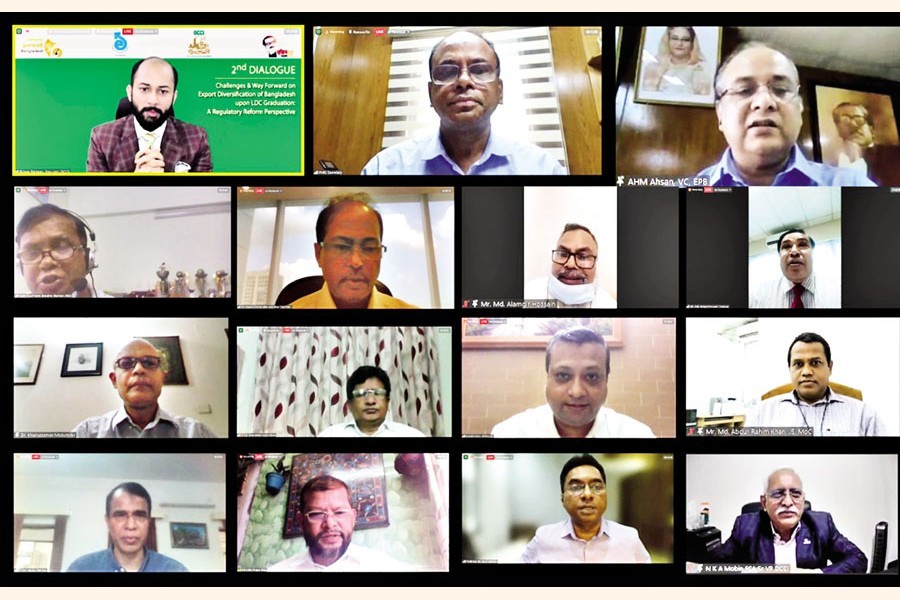Policy reforms, aligned polices with the WTO directives, fiscal and non-fiscal benefits and domestic measures are key to overcome the challenges of LDC graduation for Bangladesh, speakers said in a dialogue on "Challenges and Way forward on Export diversification of Bangladesh upon LDC graduation- A regulatory reform perspective", organized by Dhaka Chamber of Commerce & Industry (DCCI) in association with Export Promotion Bureau (EPB) on Sunday.
They also said equal treatment to the potential export-oriented sectors, competitiveness, skill development and technological advancement are similarly important in this regard.
Md. Tofazzel Hossain Miah, Secretary, Prime Minister's Office, joined as the chief guest.
Vice Chairman & CEO of Export Promotion Bureau (EPB) A.H.M. Ahsan made the opening remarks. He said that many experts estimated that due to pandemic, export of Bangladesh might fall to USD 4-6 billion. He informed that last year export earning was USD 38.75 billion, of which RMG sector alone contributed 81%, but it was 84% in the previous fiscal. It showed that non-RMG export increased despite it is not in line with the faster pace of RMG sector. He said policy reforms and policy support will expedite boosting non-RMG export. "End of the day, this is the world of business and government do not do business rather play a role of facilitator," he said.
Md. Tofazzel Hossain Miah, Secretary, Prime Minister's Office, said that we may lose a lot of waivers after graduation. But now it is the right time to grow other potential export items. Moreover, he urged to utilize country's local market. Terming private sector as the engine of growth, he said every person is the brand ambassador.
We must be competitive, he said. How can we go for more FTA or RTA we need to work out. High value product quality and stringent compliance will increase our branding.
He also underscored importance on human resource development, research and development, value chain, backward linkage.
DCCI President Rizwan Rahman presented the keynote paper. He highlighted that light engineering, jute and jute goods, IT & ITES, pharmaceutical, agro & agro-processing, leather & leather goods are some of the promising sectors other than RMG that should be facilitated before entering into the list of middle income country status.
He termed limited access to finance, shortages of skilled human resources, high duty on import of raw materials, non-tariff barriers, lengthy customs and testing processes, lack of certification, low-cost bank loan, required policy reforms, delay in implementing API Park, weak backward linkage network, lesser agricultural productivity and limited negotiation capability are some of the major challenges of these sectors to be more competitive in the international market.
With a view to promote these potential sectors ahead of LDC graduation, especially in this transition period, Rizwan Rahman put forwarded a few recommendations. He suggested to provide bonded warehouse facility like RMG, arrange low cost fund and rationalized land price for the light engineering sector.
For the jute and jute goods sector, he proposed for a simplified tax, VAT and port rules, investing in traceable research, replacing old technologies and removing VAT at all stages of manufacturing and selling of jute and jute goods. Rizwan Rahman also emphasized for proper IP valuation guidelines, data security and data privacy for IT & ITES sector.
The DCCI President further recommended for a strong negotiation with the WTO to avail exemptions on patent rights for pharmaceuticals for another 12 years under TRIPS agreement.
Technology transfer and reducing cost of production will surely boost this sector, he told. Regarding agriculture sector, Rizwan Rahman recommended for bonded warehouse facility, developing backward linkage and investing in post-harvest technology adaptation. He finally urged to create a "Food Industrial Zone" to attract foreign investors.
Shaikh Yusuf Harun, Executive Chairman (Senior Secretary), Bangladesh Economic Zones Authority (BEZA) said after LDC graduation Bangladesh will lose its preferential benefits. But Bangladesh is a country of sustainable economy and with the help of our resilient private sector we will be able to diversify our products base, he said. To diversify products and market Bangladesh need to be engaged with different regional trade group, he suggested.
"We have a good advantage of demographic dividend, but we have to convert it into a skilled workforce. Corporate tax rate in Bangladesh is comparatively high, we need to balance it, he suggested. BEZA has already signed agreement with 400 investors which would add extra USD 7 million to export earning in next two years. Now we have to give them all trade logistics including utility supports."


